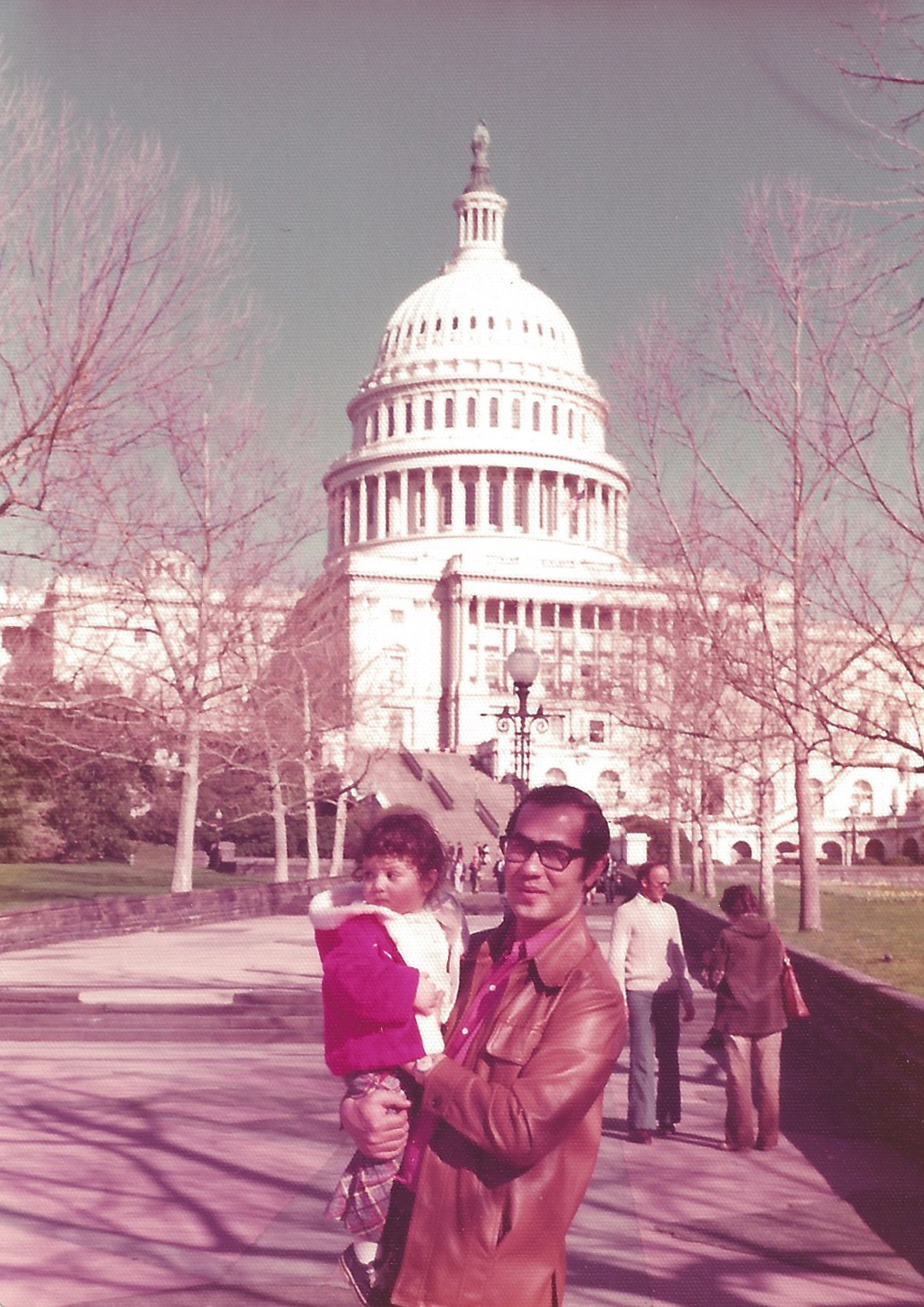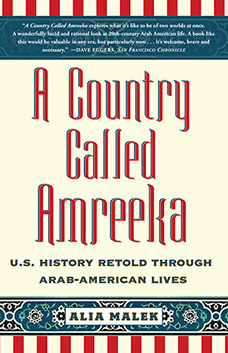

Praise
“In a beautifully rendered work, Alia Malek succeeds in a challenging task: restoring the humanity to a community too long buffeted by the vagaries of chauvinism, bias and ignorance. Her book, written with wit, compassion and insight, is at once timeless, in its telling of immigrants in America, and unique, in its exploration of the diversity of the Arab-American community. In the end, A COUNTRY CALLED AMREEKA is a stirring story of humor, loss, love and triumph.”
— Anthony Shadid
“The stories in this book are clearly told, with warmth and a quick wit, and together form a wonderfully lucid and rational look at 20th century Arab American life. A book like this would be valuable in any era, but particularly now, when we're just beginning to stumble out of the darkness of eight years of xenophobia and buckshot paranoia, it's welcome, brave and necessary.”
— Dave Eggers
“[A] deeply engaging series of portraits of Arab American lives in a profoundly complicated time. Malek’s compelling ability to imagine and construct perspectives and problems of a wide range of individuals feels intuitively masterful. This should be a textbook across the nation — even the most reluctant readers will (hopefully) be enlarged, their stereotypes neutralized.”
— Naomi Shihab Nye
“If you’re not an Arab American, then it’s really imperative for you to read this fascinating book. You couldn’t ask for a more informative, engaging, and provocative introduction to millions of our fellow citizens. From football star to soldier, from gay activist to union leader, cheerleader, minister, Democrat, Republican, Christian, Muslim – Alia Malek brings the entire spectrum of Arab America to vivid, three-dimensional life.”
— Sam Freedman
“[G]reat reading for anyone who is interested in the hyphenated American immigrant. The hopes and dreams of ordinary people who have come to the Land of Great Hope are beautifully depicted [and the] lives of [these] people are compelling for their struggles for a better life. The book is engaging and enlightening, impossible to put down."
— Helen Thomas
“[A] superb snapshot of the Americans of Arab-speaking descent … [Malek has] a remarkable ability to capture her subjects' voices…an excellent book, one certain to put right some of the wrongs it catalogues.” more...
— Publishers Weekly (starred review/Pick of the Week)
“A significant, timely contribution to the understanding of the Arab-American story.” more...
— Kirkus
“[Malek’s] direct, open style [using] diverse individual stories... works beautifully... An essential addition to the Booklist Core Collection.” more...
— Booklist
“Malek simultaneously provides insight into Arab-American life and demonstrates that these people are not "just like us" -- they are us, and the problem is not simply a lack of understanding, but also a too-narrow definition of "us," a lack of sophistication in considering where American values and Arab-American values overlap. That Malek shows us the overlap while not disregarding the sharp edges speaks to the excellence of this collection.” more...
— Minneapolis Star Tribune
"[T]he urge to link Islam to violence, or to understand violence only through the lens of Islam, has its roots in a story much older than a few weeks. It’s that story, the story of the relationship between America and its Arab Americans, that Malek brings powerfully into focus… The book looks at America through the eyes of a minority so often viewed as its enemy. As the book progresses through time, a bigger story begins to emerge… It’s an incredible journey, if momentarily stunted, and Malek chronicles that journey with authority. Malek’s book reminds us, at a particularly resonant time, that none of those stories is simple.” more...
— Christian Science Monitor
“Compelling… Ultimately, the book gives voice not just to the political side of the Middle Eastern conflict but also to the human side. Malek believes there’s more that unites us than divides us. She makes the point vividly.”
— Baltimore Sun
“Authentic, engaging and well written… Malek realized that immigrants’ rights would be better served if they were given a name and a voice, something that she does admirably in this book.” more...
— National Catholic Reporter
“A COUNTRY CALLED AMREEKA begins to fill in that gap in our collective understanding of our own history… Richly told and beautifully written, this book is [a] valuable a contribution to the American story…” more...
— Political Affairs
“Though its content is substantive, the book is a page-turner that reads like the best fiction... she explores the relationships between multiple forces — national and international, government and individual — for a uniquely holistic approach to history. Her simple, yet imaginative and poetic storytelling is suited to any audience... a welcome corrective.” more...
— Electronic Intifada
Synopsis
Among the surfeit of narratives about Arabs that have been published in recent years, surprisingly little has been written about Arabs and their longstanding lives in the United States. This book revisits American history, as it was lived by Arab Americans. It begins at a university football match in Alabama, decades before the major federal legislative changes of the 1960s would seismically transform the course of American immigration and racial reality forever. Each chapter describes an event in U.S. history — which may already be familiar to us — and invites us to live that moment in time in the skin of one Arab American. The chapters follow a timeline that ends in 2003, and the characters live in every corner of this country.
These are dramatic narratives, describing the very human experiences of love, friendship, family, courage, hate, and success. There are the timeless tales of an immigrant community becoming American, the nostalgia for home, the alienation from a society sometimes as intolerant as its laws are generous. A COUNTRY CALLED AMREEKA’S snapshots allow us the complexity of its characters’ lives with an impassioned narrative normally found in fiction.
Read separately, the chapters are entertaining and harrowing vignettes; read together, they add a new tile to the mosaic of our history. We meet fellow Americans of all creeds and colors, among them the Alabama football player who navigates the stringent racial mores of segregated Birmingham, where a church bombing wakes a nation to the need to make America a truly more equal place; the young wife from Ramallah — now living in Baltimore — who had to abandon her beautiful home and is now asked by a well-meaning American, “How do you like living in an apartment after living in a tent?”; the Detroit toughs and the pot-smoking suburban teenagers, who in different decades become politicized and serious about their heritage despite their own wills; the homosexual man afraid to be gay in the Arab world and afraid to be Arab in America; the two formidable women who wind up working for opposing campaigns in the 2000 presidential election; the Marine fighting in Iraq who meets villagers who ask him, “What are you, an Arab, doing here?” We glimpse how America sees Arabs as much as how Arabs see America. We revisit the 1973 oil embargo that initiated the American perception of all Arabs as oil-rich sheikhs; the 1979 Iranian hostage crisis that heralded the arrival of Middle Eastern Islam in the American consciousness; bombings across three decades in Los Angeles, Oklahoma City, and New York City that bring terrorism to American soil; and both wars in Iraq that have posed Arabs as the enemies of America.
In a post-9/11 world, Arabic names are everywhere in America, but the lives behind those names are rarely given much exposition – a factor that continues to contribute to the heightened and troubling rhetoric and policies directed against Arabs and Muslims in the United States. A COUNTRY CALLED AMREEKA tells the story of those Americans too often excluded from how we imagine American history and who makes up contemporary American society.
Buy
© 2017 Alia Malek
design and hosting by noumenon designs